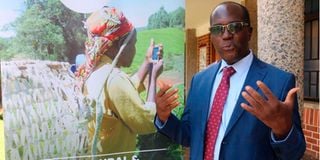Why the future of agriculture is digital

Mr. Thomas T. Essel, AFRACA Secretary General.
What you need to know:
- Thomas T. Essel is the secretary-general of African Rural and Agricultural Credit Association (AFRACA), which recently held a conference in Nairobi on digital financing and agriculture. He shares why he believes the future of agriculture is digital.
Agriculture still lags behind when it comes to digital transformation, particular financing. What holds it back and do you think this is where its future lies?
We have no choice but to digitise. The traditional ways of accessing financing have not worked well for farmers. Digitised farm inputs and services makes farming easier. It strengthens agricultural infrastructure, and a farmer is put in a position to where the inputs are at an affordable price.
Away from financing, moving agriculture services to the digital space is key to success. This takes extension services closer to the farmers and at a cheaper cost.
But again, if we really want to help them, the issue of language should be factored in and make it comprehensible to farmers and value chain actors who do not understand English. If we have the information in the language farmers understand well, it becomes easier to embrace modern technologies.
So far, how is the reception towards digitising agricultural services in Africa?
From our study, many African governments are receptive to digitising agriculture. I can attest that every country in Africa is pushing for it, though they are at different levels in terms of implementation. But even as countries do this, there is need to increase awareness on these technologies.
As compared to other services, digital agricultural financing is growing faster due to the fact that mobile money is ubiquitous and most people own mobile phones. How do we push other sectors to be digital, for instance, irrigation?
Traditional methods of farming are very common in African countries, making it hard to boost food security in a continent frequently faced by hunger and malnutrition.
Many farmers are hooked to old ways of producing and processing food. Well, such models were meaningful when the population was low, but Africa is now an over 1.2 billion people continent.
We need to mechanise and embrace farm machines that are digitally controlled so that farming is not confined to rural areas and to the uneducated people.
Tools and machines such as tractors and combine harvesters can now be digitally operated. This will increase efficiency and cost-effectiveness.
Climate change effects, particularly drought and pests like locusts, have hit harder Kenya, Somalia and Ethiopia in the Horn of Africa. How can digitisation help the countries overcome these effects?
Climate change is a big issue in Africa, resulting in drought, floods, diseases and locusts. All these reduce food production worsening food security.
Digital technologies can come in, in terms of giving accurate weather forecasts and disseminating the information to farmers to enhance preparedness and mapping of affected areas to develop responses.
Your last word to governments, banks, agricultural organisations and farmers in digital financing?
As Afraca, we support agriculture and partner with Central Banks, commercial banks, development banks and micro-finance institutions, among others.
What we tell them is that they need to create opportunity for agriculture and farmers in their businesses. Farmers would certainly perform better when they get support and are trained on good agricultural practices.
This support creates an enabling environment that financial institutions can bank on. Once farmers have the right technical knowhow and equipment, banks will not see them as risky borrowers.





